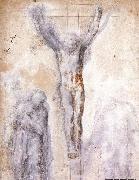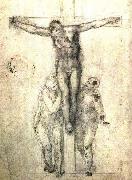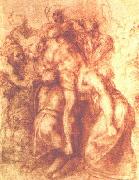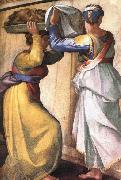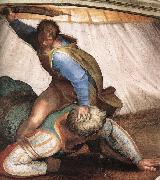Michelangelo Buonarrotib Caprese 1475 d Rome 1564 | |||
 |
|||
|
|
|
||||||||||
|
|
||||||||||
|
Christ Crucified between the Virgin and Nicodemus ID de tableau:: 62891 Voir la galerie dans Suède |
Christ Crucified between the Virgin and Nicodemus 1552-54 Black chalk, brown wash and white lead, 43,3 x 29 cm Musee du Louvre, Paris Artist: MICHELANGELO Buonarroti Title: Christ Crucified between the Virgin and Nicodemus Date: 1501-1550 Italian , graphics : religious 1552-54_Black_chalk,_brown_wash_and_white_lead,_43,3_x_29_cm_Musee_du_Louvre,_Paris_Artist:_MICHELANGELO_Buonarroti_Title:_Christ_Crucified_between_the_Virgin_and_Nicodemus_Date:_1501-1550_____Italian__,_graphics_:_religious |
|||||||||
|
|
||||||||||
|
Crucifix ID de tableau:: 62892 Voir la galerie dans Suède |
Crucifix 1556 Black chalk and white lead on paper, 412 x 279 mm British Museum, London The drawings Michelangelo did for his own personal use show us better than any of these other works something of the artist's development during his last years. The last of the six drawings of Crucifixions, depicting Christ on the cross between the Virgin and Saint John, is probably to be dated to 1556. This shows us, once again, those same ideas which had tormented the artist during his work on the PieteRondanini: "Oh! Flesh, Blood and Wood, supreme pain, Through you must I suffer my agony." These lines, which the artist had written at the age of 57, seem to convey the dominant feeling in the Madonna and Saint John, gathered around the Cross. Fear and pain have drawn the Madonna to Christ's body, while St. John turns towards Him in supplication, with one arm around the Cross. In this female figure there is nothing of the Mother of God represented in his 1499 Piete nor does the Evangelist recall anything of the 1505 St. Matthew. Nowhere are the changes of this half century so clearly demonstrated as in the life and work of Michelangelo Buonarroti. Artist: MICHELANGELO Buonarroti Title: Crucifix Date: 1501-1550 Italian , graphics : religious 1556_Black_chalk_and_white_lead_on_paper,_412_x_279_mm_British_Museum,_London_The_drawings_Michelangelo_did_for_his_own_personal_use_show_us_better_than_any_of_these_other_works_something_of_the_artist's_development_during_his_last_years._The_last_of_the_six_drawings_of_Crucifixions,_depicting_Christ_on_the_cross_between_the_Virgin_and_Saint_John,_is_probably_to_be_dated_to_1556._This_shows_us,_once_again,_those_same_ideas_which_had_tormented_the_artist_during_his_work_on_the_PieteRondanini:_"Oh!_Flesh,_Blood_and_Wood,_supreme_pain,_Through_you_must_I_suffer_my_agony."_These_lines,_which_the_artist_had_written_at_the_age_of_57,_seem_to_convey_the_dominant_feeling_in_the_Madonna_and_Saint_John,_gathered_around_the_Cross._Fear_and_pain_have_drawn_the_Madonna_to_Christ's_body,_while_St._John_turns_towards_Him_in_supplication,_with_one_arm_around_the_Cross._In_this_female_figure_there_is_nothing_of_the_Mother_of_God_represented_in_his_1499_Piete_nor_does_the_Evangelist_recall_anything_of_the_1505_St._Matthew._Nowhere_are_the_changes_of_this_half_century_so_clearly_demonstrated_as_in_the_life_and_work_of_Michelangelo_Buonarroti._Artist:_MICHELANGELO_Buonarroti_Title:_Crucifix_Date:_1501-1550_____Italian__,_graphics_:_religious |
|||||||||
|
|
||||||||||
|
Study for a Deposition ID de tableau:: 62893 Voir la galerie dans Suède |
Study for a Deposition 1555 Red chalk on paper Ashmolean Museum, Oxford Artist: MICHELANGELO Buonarroti Title: Study for a Deposition Date: 1501-1550 Italian , graphics : study 1555_Red_chalk_on_paper_Ashmolean_Museum,_Oxford_Artist:_MICHELANGELO_Buonarroti_Title:_Study_for_a_Deposition_Date:_1501-1550_____Italian__,_graphics_:_study |
|||||||||
|
|
||||||||||
|
Judith and Holofernes ID de tableau:: 62895 Voir la galerie dans Suède |
Judith and Holofernes 1509 Fresco Cappella Sistina, Vatican In the fresco, almost in the center and nearest to the viewer, the figures of the two women stand out in the bright light against the white wall placed obliquely in the background. Judith is portrayed as she is about to place a cloth over the severed head of Holofernes, which the maidservant is carrying in a tray held on her head. The biblical heroine's face is hidden because she is looking toward the darkened room on the right where, sprawled on the white sheets of the bed, the headless body of the general, depicted with complex foreshortening, appears still to be in a state of frenzied agitation. Judith and the maidservant form a compact group that is given prominence by strong contrasts and passages of very bright colours: the smalt-blue of Judith's bonnet and dress and the yellow of the borders and oversleeve; the delicate green, with rose-white reflections, of the tunic and the crimson of the belt and sash, repeated with darker tones in the maidservant's tunic, which is lined with deep violet that stands out against the yellow with iridescent greenish shadows of the dress. Artist: MICHELANGELO Buonarroti Title: Judith and Holofernes (detail) Date: 1501-1550 Italian , painting : religious 1509_Fresco_Cappella_Sistina,_Vatican_In_the_fresco,_almost_in_the_center_and_nearest_to_the_viewer,_the_figures_of_the_two_women_stand_out_in_the_bright_light_against_the_white_wall_placed_obliquely_in_the_background._Judith_is_portrayed_as_she_is_about_to_place_a_cloth_over_the_severed_head_of_Holofernes,_which_the_maidservant_is_carrying_in_a_tray_held_on_her_head._The_biblical_heroine's_face_is_hidden_because_she_is_looking_toward_the_darkened_room_on_the_right_where,_sprawled_on_the_white_sheets_of_the_bed,_the_headless_body_of_the_general,_depicted_with_complex_foreshortening,_appears_still_to_be_in_a_state_of_frenzied_agitation._Judith_and_the_maidservant_form_a_compact_group_that_is_given_prominence_by_strong_contrasts_and_passages_of_very_bright_colours:_the_smalt-blue_of_Judith's_bonnet_and_dress_and_the_yellow_of_the_borders_and_oversleeve;_the_delicate_green,_with_rose-white_reflections,_of_the_tunic_and_the_crimson_of_the_belt_and_sash,_repeated_with_darker_tones_in_the_maidservant's_tunic,_which_is_lined_with_deep_violet_that_stands_out_against_the_yellow_with_iridescent_greenish_shadows_of_the_dress._Artist:_MICHELANGELO_Buonarroti_Title:_Judith_and_Holofernes_(detail)_Date:_1501-1550_____Italian__,_painting_:_religious |
|||||||||
|
|
||||||||||
|
David and Goliath ID de tableau:: 62896 Voir la galerie dans Suède |
David and Goliath 1509 Fresco Cappella Sistina, Vatican A sheet of light descends from David's shoulder along the sleeve of his tunic (painted smalt-blue with lime-white reflections) to the head of Goliath, who is sprawled on the ground, stressing his centrality to the composition and highlighting the dramatic violence of the action. The composition was carefully planned in order to neutralize, as far as possible, the irregular shape of the field, dramatically forcing the predominant line of sight by means of the bold foreshortening of the two figures and the luminous convexity of the white tent, modeled with violet shadows. In the foreground, toward the lower vertex of the triangle, David's sling, lying on the ground, constitutes the starting point of the projection of the perspective along the central axis of the composition. Artist: MICHELANGELO Buonarroti Title: David and Goliath (detail) Date: 1501-1550 Italian , painting : religious 1509_Fresco_Cappella_Sistina,_Vatican_A_sheet_of_light_descends_from_David's_shoulder_along_the_sleeve_of_his_tunic_(painted_smalt-blue_with_lime-white_reflections)_to_the_head_of_Goliath,_who_is_sprawled_on_the_ground,_stressing_his_centrality_to_the_composition_and_highlighting_the_dramatic_violence_of_the_action._The_composition_was_carefully_planned_in_order_to_neutralize,_as_far_as_possible,_the_irregular_shape_of_the_field,_dramatically_forcing_the_predominant_line_of_sight_by_means_of_the_bold_foreshortening_of_the_two_figures_and_the_luminous_convexity_of_the_white_tent,_modeled_with_violet_shadows._In_the_foreground,_toward_the_lower_vertex_of_the_triangle,_David's_sling,_lying_on_the_ground,_constitutes_the_starting_point_of_the_projection_of_the_perspective_along_the_central_axis_of_the_composition._Artist:_MICHELANGELO_Buonarroti_Title:_David_and_Goliath_(detail)_Date:_1501-1550_____Italian__,_painting_:_religious |
|||||||||
|
|
||||||||||
| Artiste précédent Artiste prochain | ||||||||||
|
|
||||||||||
| Michelangelo Buonarroti | ||||||||||
| b Caprese 1475 d Rome 1564 | ||||||||||
|
|
||||||||||
IntoFineArt Co,.Ltd.







